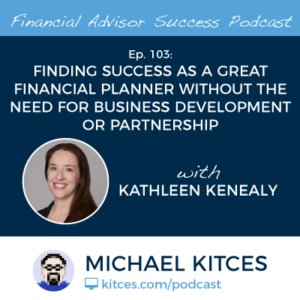Arguably, the hardest thing for most financial advisors is not just learning their craft, but rather generating leads and finding new prospective clients to get in front of in the first place. As no matter how good an advisor is at giving great advice and helping people move towards their goals in life, the sad fact is that there aren’t that many folks who wake up in the middle of the night in a cold sweat because they suddenly realized they don’t have a comprehensive financial plan! Which means that an advisor not only needs to be good at what they do, but they also need to learn how to effectively market their services and communicate their value to people that they might do business with. Because if there aren’t prospective new clients coming through the door, eventually the practice simply won’t be a viable business anymore.
For most advisors struggling to grow, the natural solution is to cast an ever-wider net to try and attract anyone who might be willing to pay for advice. Unfortunately, though, such an approach makes it remarkably difficult to differentiate yourself… as when trying to market to everyone, it’s almost impossible to be differentiated for any of them. Instead, by focusing in on a specific and narrow target market, it becomes much easier to create and distribute very targeted marketing messages that resonate with your chosen niche.
Yet just saying that you serve a particular niche isn’t enough. To truly gain a deep understanding of the type of client you want to attract and figure out how to market to them effectively, Katie Godbout, the director of sales and marketing for Covisum, highlights in this guest post one of the most powerful tools any marketer can use to get very specific about who they’re targeting and how to reach them… the client persona.
The client persona is a detailed description of an ideal target client, which describes (among other things) their demographics, specific pain points and goals, where and how they spend their time and money, and (most importantly) how your services meet their specific needs. Which matters because, as Katie explains, by putting yourself in the shoes of these hypothetical clients you can determine if your messaging will really resonate with prospective clients, if the marketing channels you choose would actually reach them in the first place, and if the client experience you create will really foster the creation of a long-term relationship (so that you can effectively systematize and replicate that experience for other similar target clients as well).
Ultimately, by painting a crystal clear picture of an ideal client and targeting them accordingly, advisors will find that they come across prospects that aren’t a good match and might be better served by another advisor whose service offering meets their needs. But in a world where an advisor can create a wildly successful business by serving 50 (or fewer) of their ideal clients, getting very specific about the details and characteristics of the exact ideal client you want to serve will go a long way towards ensuring that when you do find one, your marketing messages resonate and attract him/her to actually become one of your ideal clients.

 Welcome back to the 104th episode of Financial Advisor Success Podcast!
Welcome back to the 104th episode of Financial Advisor Success Podcast! Welcome back to the 103rd episode of Financial Advisor Success Podcast.
Welcome back to the 103rd episode of Financial Advisor Success Podcast.
